Politics
About Andrew Cusack
 Writer, web designer, etc.; born in New York; educated in Argentina, Scotland, and South Africa; now based in London.
Writer, web designer, etc.; born in New York; educated in Argentina, Scotland, and South Africa; now based in London. read more
News
Blogs
Reviews & Periodicals
Arts & Design
World
France
Mitteleuropa
Knickerbockers
Argentina
The Levant
Africa
Cape of Good Hope
Netherlands
Scandinavia
Québec
India
Muscovy
Germany
Academica
Aquinas Visited Yugoslav Abortionist in Dream, Now Defender of the Unborn
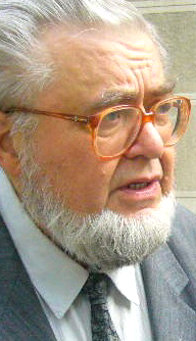 Madrid, Nov 12, 2008 / 09:21 pm (CNA). — The Spanish daily “La Razon” has published an article on the pro-life conversion of a former “champion of abortion.” Stojan Adasevic (pictured, right), who performed 48,000 abortions, sometimes up to 35 per day, is now the most important pro-life leader in Serbia, after 26 years as the most renowned abortion doctor in the country.
Madrid, Nov 12, 2008 / 09:21 pm (CNA). — The Spanish daily “La Razon” has published an article on the pro-life conversion of a former “champion of abortion.” Stojan Adasevic (pictured, right), who performed 48,000 abortions, sometimes up to 35 per day, is now the most important pro-life leader in Serbia, after 26 years as the most renowned abortion doctor in the country.
“The medical textbooks of the Communist regime said abortion was simply the removal of a blob of tissue,” the newspaper reported. “Ultrasounds allowing the fetus to be seen did not arrive until the 80s, but they did not change his opinion. Nevertheless, he began to have nightmares.”
In describing his conversion, Adasevic “dreamed about a beautiful field full of children and young people who were playing and laughing, from 4 to 24 years of age, but who ran away from him in fear. A man dressed in a black and white habit stared at him in silence. The dream was repeated each night and he would wake up in a cold sweat. One night he asked the man in black and white who he was. ‘My name is Thomas Aquinas,’ the man in his dream responded. Adasevic, educated in communist schools, had never heard of the Dominican genius saint. He didn’t recognize the name”
“Why don’t you ask me who these children are?” St. Thomas asked Adasevic in his dream.
“They are the ones you killed with your abortions,’ St. Thomas told him.
“Adasevic awoke in amazement and decided not to perform any more abortions,” the article stated.
“That same day a cousin came to the hospital with his four months-pregnant girlfriend, who wanted to get her ninth abortion—something quite frequent in the countries of the Soviet bloc. The doctor agreed. Instead of removing the fetus piece by piece, he decided to chop it up and remove it as a mass. However, the baby’s heart came out still beating. Adasevic realized then that he had killed a human being,”
After this experience, Adasevic “told the hospital he would no longer perform abortions. Never before had a doctor in Communist Yugoslavia refused to do so. They cut his salary in half, fired his daughter from her job, and did not allow his son to enter the university.”
After years of pressure and on the verge of giving up, he had another dream about St. Thomas.
“You are my good friend, keep going,’ the man in black and white told him. Adasevic became involved in the pro-life movement and was able to get Yugoslav television to air the film ‘The Silent Scream,’ by Doctor Bernard Nathanson, two times.”
Adasevic has told his story in magazines and newspapers throughout Eastern Europe. He has returned to the Orthodox faith of his childhood and has studied the writings of St. Thomas Aquinas.
“Influenced by Aristotle, Thomas wrote that human life begins forty days after fertilization,” Adasevic wrote in one article. La Razon commented that Adasevic “suggests that perhaps the saint wanted to make amends for that error.” Today the Serbian doctor continues to fight for the lives of the unborn.
A New Speaker in Quebec
Opposition parties unite to elect new President of the Assembly
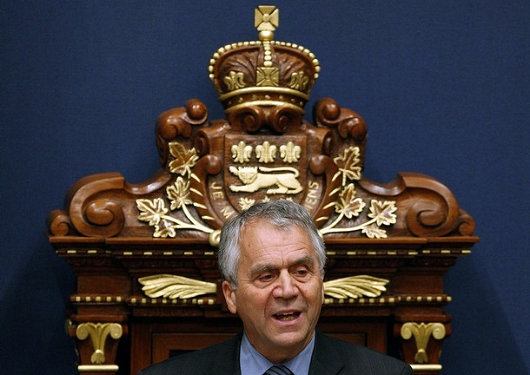
François Gendron, the longest-serving member of Quebec’s National Assembly, has been elected Speaker against the will of the province’s prime minister, Jean Charest. The ADQ (conservative, autonomist) and PQ (social-democratic, pro-independence) are opposition parties but combined have more seats than the Libéral (center-left/center-right) minority government Mr. Charest leads. Action democratique du Québec and the Parti Québécois united to select Mr. Gendron without consulting Mr. Charest, which the premier described as a “breach of confidence” that was the result of “subterfuge”. The vote took place by secret ballot, and it was only in the hours before that the opposition parties withdrew their respective candidates in favour of a united ticket for Gendron.
Questions on the Present ‘Crisis’
I know next to nothing about finance and economics, but since stock prices which had previously been ridiculously inflated are now falling to their actual value: isn’t that a good thing? Shouldn’t we be glad the correction is finally happening and shouldn’t we have wished it had come sooner? Isn’t this something that should provoke a sigh of relief? Doesn’t all this panic on Wall Street make the financiers look like a bunch of little girls?
Of course in the old days, you had men in charge. J.P. Morgan was the head of J.P. Morgan, and by gum that meant something. There was someone to be accountable to. Nowadays, no one person owns anything, which is to say, everything is owned by everyone. As the American Loyalist of old oft said: “I would rather be ruled by one tyrant a thousand miles away then by a thousand tyrants not one mile away.” When you had a giant like Morgan around, he could invite everyone round and sort things out. Now, CEOs come and go and are accountable, not to one man, but to “shareholders”, who are apparently legion, and not terribly keen on holding their henchmen to account during the times when the profits are flowing in. The same goes for finance ministers and the central bankers.
Out with them all, I say, and bring back Mr. Morgan!
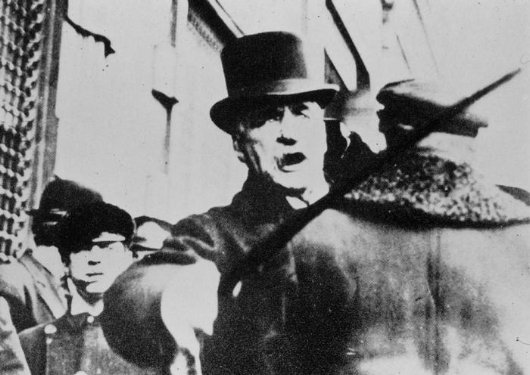
Mr. Morgan did not appreciate having his photograph taken.
Words of Windisch-Grätz Wisdom
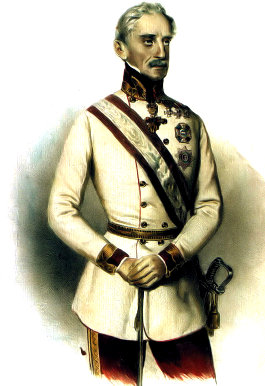
Prince of Windisch-Grätz
on the liberal constitutionalist rebels
Ron Paul in The Economist
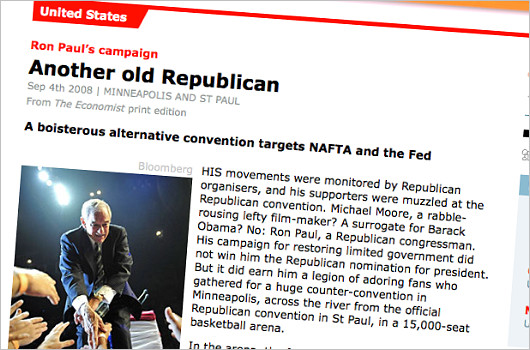
As self-styled newspapers go, The Economist is wrong on most things — furthermore it broadcasts its Establishment errors with an undeserved arrogance and a haughty tone. (For our hebdomadal reading, we prefer another publication). Nonetheless, we cannot resist giving credit where credit is due, and The Economist recently published a short, relatively balanced piece on Ron Paul’s counter-convention in Minneapolis. It is reproduced here:
What was that you were saying about “cheese-eating surrender monkeys”?
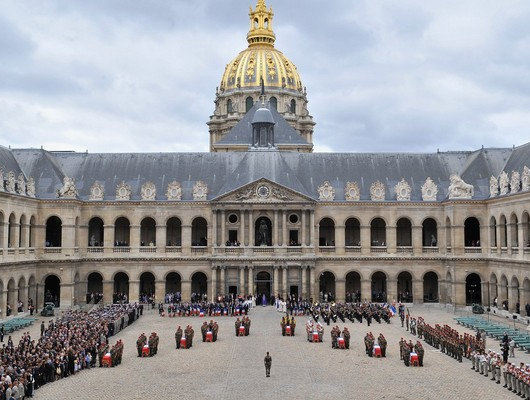
Yann Baly writes:
“Regarding the sacrifice of the 10 young French soldiers killed in combat in Afghanistan, we have heard many voices, including those of the families of the young parachutists, saying that they died for nothing.
“Politicians are duty-bound to question the timeliness of our engagement in Afghanistan under NATO command, in a war desired by the United States. We cannot remain silent when France, and French youth have, in the past, paid too heavy a price because of “sacred” unions in wars that diplomacy and sensible politics could have avoided.

“Yesterday, in the majestic courtyard of les Invalides, the French people were able to recall that certain political errors are paid for in blood. It is therefore legitimate to wonder if Jacques Chirac (who was not present yesterday) and Lionel Jospin were right to send the French army into Afghanistan in 2001 and if Nicolas Sarkozy was not wrong to reenforce the contingent with the inadequate means we are all aware of. As Bernard Antony has reminded us, the United States has committed so many errors of foreign policy, so many criminal mistakes in its diplomatic and military actions, that one can doubt the need to be present in Afghanistan. History shows us that economic and oil interests have often been a decisive element in the American involvement in military conflicts. Fight efficiently against terrorism? There too, there are questions to be asked.

“Nonetheless, it is false to say that our young parachutists died for nothing. First of all, the French people have become conscious once again that they had an army. A month and a half after the tragedy in Carcassonne, the blood of these soldiers has washed away the lies, insults and spite, some of it coming from the head of State himself, heaped on the French army. But most of all, in our society where egoism and individualism are the rule, for a people who seem to have forgotten the meaning of sacrifice, their death in combat, at the age of 20 for most of them, is no doubt a sign of an imminent resurrection of the spirit of French resistance. In the current international and national context, this dimension is not insignificant. France, like the rest of the world, is entering into a period of uncertainties and grave risks. To be conscious of that and to prepare for it is not nothing.”


Propaganda Fide

Cheers to the unknown wag who created this delightful poster, parodying the Obama “HOPE” posters.
Alexander Solzhenitsyn, 1918–2008
Russian traditionalist, Nobel laureate, feted in the West for criticism of Soviet Communism, then spurned for rejecting liberal materialism

Alexander Isayevich Solzhenitsyn, the most famous Russian writer and historian of our age, has died at eighty-nine years of age. Solzhenitsyn was the earliest to bring first-hand knowledge of the Gulag, the Soviet system of prison colonies and labour camps, to wider Western attention. For this noble task, he was awarded the Nobel Prize for Literature in 1970 and expelled from the Soviet Union four years later, returning in 1994. After the fall of the Soviet regime, he despised Boris Yeltsin’s incompetence, identifying 1998 as the low point of Russia’s recent history. “Yeltsin decreed I be honored the highest state order,” Solzhenitsyn explained. “I replied that I was unable to receive an award from a government that had led Russia into such dire straits.”
He gave cautious support to the presidency of Vladimir Putin, and was pleased that while, in his words, “Moscow is still communist”, there was a growing readiness under Putin to admit (and even broadcast on state television) the crimes and outrages of the Soviet regime.
“Putin inherited a ransacked and bewildered country, with a poor and demoralized people. And he started to do what was possible — a slow and gradual restoration. These efforts were not noticed, nor appreciated, immediately. In any case, one is hard pressed to find examples in history when steps by one country to restore its strength were met favorably by other governments.”
Influenced by his experience in exile in both Switzerland and New England, Solzhenitsyn insisted on the need for local self-government in Russia. “Today I continue to be extremely worried by the slow and inefficient development of local self-government. But it has finally started to take place. In Yeltsin’s time, local self-government was actually barred on the regulatory level, whereas the state’s ‘vertical of power’ (i.e. Putin’s centralized and top-down administration) is delegating more and more decisions to the local population. Unfortunately, this process is still not systematic in character.”
Solzhenitsyn expressed further disappointment with the new Western imperialism being waged against Russia, embodied in the 1999 War against Serbia which turned so many Russian minds against the Western powers they had previously been quite friendly to.
In a recent interview with Der Spiegel, Solzhenitsyn was asked whether he was afraid of death:
“No, I am not afraid of death any more. When I was young the early death of my father cast a shadow over me — he died at the age of 27 — and I was afraid to die before all my literary plans came true. But between 30 and 40 years of age my attitude to death became quite calm and balanced. I feel it is a natural, but no means the final, milestone of one’s existence.”
When the interviewer from Der Spiegel wished him many more years of “creative life”, Solzhenitsyn calmly responded “No, no. Don’t. It’s enough.”
High Drama in Argentina’s Halls of Power

IT IS AN age-old question: what happens when an irresistible force meets an immovable object? The force in question is the farming community of Argentina, once among the agricultural powerhouses of the world, and the object is the country’s slippery presidential couple, President Cristina Fernández de Kirchner and her husband (and predecessor in the top job) Néstor Kirchner. From all the way back in March, the Kirchners have been locked in a bitter dispute with the farming sector of the country since the presidential couple unilaterally imposed a massive tax on soy exports.
The Kirchners deride the farmers as “oligarchs” and claim that the exorbitant tax on one of Argentina’s most successful commercial sectors will be redistributed to the poor. Of course it would be irresponsible to simply take from the haves and give to the have-nots; the money raised would only go to the deserving poor, namely those who happen to support the Kirchner regime. Along the way, every cog in the machine will take his fair share, with a respectable amount left over to fatten the calves (metaphorically speaking) of the Kirchnerite street operators who quite openly buy votes during election time and pay union members to show up at pro-government rallies in between.

Argentine farmers protesting the Kirchner soy tax.
Humiliating Defeat in the Heart of Labour

Well, it looks like they’ve done it: the SNP have slashed a Labour majority of over 13,000 to win the parliamentary seat of Glasgow East with a new Nationalist majority of just 365 votes. The Conservatives and the Liberal Democrats came third and fourth, but with 1,693 and 915 votes respectively, this was very much a two-pony race between Labour’s Margaret Curran (above, left) and the SNP’s John Mason (above, right).
While Glasgow East is deep in the heart of Labour territory, pundits were saying this was going to be a close one. The defection of Catholics is likely to have played a significant role in Labour’s defeat. In the past year, Labour have legalized the creation of animal-human hybrids as well as siblings designed solely for the harvesting of their organs, and this campaign has been vociferously opposed by Catholics around the Union. Mr. Mason made sure to thank those who had prayed for him in his victory speech.
“This is an absolutely remarkable result,” said Angus Robertson, SNP leader at Westminster, “it’s Labour’s third-safest seat — rock-solid territory. Now it’s over. People have had enough and Gordon Brown had better listen because at the next Westminster election the SNP is coming.”
This is the second “safe” Labour seat lost in a by-election in just three months.

Catholic backlash sinks Labour in Glasgow East
Cranmer:
SNP victory in Glasgow East – the Christians won it
the Daily Telegraph:
Labour suffers humiliating defeat as SNP celebrates
the Times:
Nightmare result for Gordon Brown as SNP triumph over Labour in Glasgow East
the Guardian:
Glasgow East byelection victory adds remarkable new chapter to SNP history
Google News:
Glasgow East
Uribe for the White House?

Daniel Hannan, the best MEP blogger there is, thinks that Álvaro Uribe should take over the reins of the United States when he finishes his second term as President of Colombia. As Mr. Hannan points out, Uribe “has a better record on defeating terrorism than anyone else in the world, he’s a successful free marketer, and he’s the most pro-US leader in the Western Hemisphere.” Sadly, being pro-US is usually a bad sign in world leaders these days, but President Uribe is the exception that tests the rule.
President Uribe currently enjoys a 90% approval rating; President Bush hovers around 30%, while the United States Congress has reached a whopping 9% approval rating.
Gaudium magnum
The fruit of many prayers: Ingrid Betancourt is free

What a splendid thing is the liberation of Ingrid Betancourt after being held in captivity by the FARC for six years and five months. The Franco-Colombian politician was freed by the Armed Forces of Colombia in a raid planned so well that not even a single shot was fired. Ms. Betancourt has hailed the rescue operation as “perfect” and expressed her profound thanks to the Colombian military. It is understood that the commandos had an opportunity to take out as many as fifty FARC guerrillas but declined to both as a token of goodwill and in order to further encourage the massive desertions the FARC has suffered recently.
This is wonderful news for Betancourt’s family, but it is also great for Colombia and for the President of Colombia, Álvaro Uribe. President Uribe has been working feverishly during his time in office to restore the rule of law and the legitimate government throughout the troubled South American country. In contrast to his predecessors, he has been outstandingly successful in fighting the FARC (Revolutionary Armed Forces of Colombia), a Marxist guerrilla group and drug cartel that has terrorized the nation.
You will no doubt recall that President Uribe recently implored the intercession of the Blessed Virgin to prevent a possible war with Venezuela and Ecuador. We should all pray, as President Uribe does, for a Columbia that is united, free, peaceful, and just.
Stat Belgium, stat Europa

The Crown of Disenchantment
Over in Great Britain, the House of Commons recently passed the Human Fertilisation and Embryology Bill which, among other things, keeps the time limit on abortions at twenty-four weeks (in spite a hope that it would be lowered), authorizes the creation of “savior siblings (brothers and sisters deliberately created in a lab solely for their organs to be harvested for use by the already-born), and allows for the creation of animal-human hybrids. The British human rights activist James Mawdsley, famously jailed for over a year by the military junta in Burma, has asked opponents of the HFE Bill to sign a petition to Queen Elizabeth II imploring her to withhold the royal assent necessary for the Bill to become law.
Under the British constitution, a bill only becomes a law when it has received the assent of all three components of the British Parliament: the Commons, the Lords, and the Crown. The last time the Crown withheld consent was in 1708 when Queen Anne refused to sign the Scottish Militia Bill. Since that time, it has been an unspoken convention that should the Crown object to a piece of legislation, it should privately inform its ministers before the legislation is voted upon in order for it to be withdrawn, thus preventing the scandal of the Crown and the Commons appearing to be in disagreement. Despite this convention, however, the Crown still has the right to withhold consent, but merely neglects to exercise that right.
While the Crown has faded to near-irrelevance in the everyday workings of the British government, this was certainly not always the case, and the Crown has intervened in politics several times since Queen Anne’s refusal of assent in 1708. What follows are but a few twentieth-century examples.
In 1925, William Mackenzie King was Prime Minister of Canada with 99 Liberal MPs to the Conservative opposition’s 116. He was able to do this by forming a minority government with the support of the 24 MPs of the Progressive Party. A year later, Liberal MPs were implicated in a bribery scandal and so the Progressives having withdrawn their support for the minority government. As parliament debated a motion to censure the MPs involved, the Prime Minister asked Lord Byng, the Governor-General of Canada (and thus the direct representative of the Crown), to dissolve parliament and call a general election.
Lord Byng did not want it to appear that the Crown was allowing parliament to be dissolved in order to prevent the censure of government MPs and so used the royal prerogative and refused to call an election. The Conservatives, as the largest party in parliament (Lord Byng argued), should have a chance at forming a government instead. The Governor-General invited Arthur Meighen, leader of the Conservatives, to form a government instead, and Meighen agreed. This, in turn, infuriated not only the Liberals but also the Progressives, throwing the middle-man back into the Liberal camp. Meighen put his government up to a vote of confidence, lost it by one vote, and so resigned and asked the Governor-General to dissolve parliament and call an election, which Lord Byng duly did.
“I have to await the verdict of history to prove my having adopted a wrong course,” Lord Byng wrote, “and this I do with an easy conscience that, right or wrong, I have acted in the interests of Canada and implicated no one else in my decision.”
In 1931, when the Labour Prime Minister Ramsay MacDonald submitted his resignation to the King, George V took the unprecedented step of asking MacDonald to form a national government with the support of Conservatives and Liberal Members of Parliament. MacDonald lasted as Prime Minister until 1935, but Great Britain would not be governed by a single-party government again until 1945.
More recently, the Crown controversially intervened in Australian politics in 1975. Gough Whitlam’s Labor government commanded a majority in the House of Representatives but the opposition coalition of the Liberals and the National Country Party held sway in the Senate. It is traditional in Westminster-style systems that if a money supply bill fails to pass, the government falls with it. The Senate refused to vote on the annual Budget, in hopes of provoking Whitlam into calling a new election. Whitlam stubbornly refused, and the impasse grew as the weeks passed and, with no budget approved, it looked like the government of Australia would not be able to meet its financial obligations for the year.
Finally, the Governor-General of Australia, Sir John Kerr, used the royal prerogative to dismiss Whitlam as Prime Minister, asked the opposition leader Malcolm Fraser to take the job. Fraser formed a caretaker government solely to pass the appropriations bill then immediately called a new election which his own Liberal/National Country coalition won handily.
Such royal interventions, however, are not limited to the English-speaking world. Belgium’s King Baudouin I, a Charismatic Catholic and friend of Francisco Franco, famously refused to give assent to a bill liberalizing the kingdom’s abortion laws. The Prime Minister, Wilfred Martens, simply had the King declared temporarily unable to reign and the Government signed the Bill in place of the King (as is provided in the Belgian Constitution). Two days later, the Government declared the King able to reign once more, and all was back to normal (except for the unborn children killed thereafter, of course).
One of the great benefits of a monarchy is this: that the Crown act as a source of authority, free from democratic accountability, who is capable of blocking any egregious acts which the government of the day may attempt. The HFE Bill is the perfect example of a bill the Crown ought to reject, for the benefit of all the kingdom, most especially the unborn. Yet we can reasonably assume that Elizabeth II will grant her assent to this travesty of law nonetheless, as the current occupant of the throne has (ironically) so thoroughly and woefully imbibed the democratic spirit that she knows not how to fulfill her purpose and duty as Queen. (It is important to note that in neither the King-Byng affair nor the Whitlam-Kerr affair was the Governor General acting on the orders of the actual person who was the Crown at the time, but rather on their dutiful instinct as the local incarnation thereof). It is disappointing to those who are unflinching in their attempts to defend the British Monarchy that the British Monarchy insists on participating in, and sometimes urging on, the very sort of wickedness which we look to the Crown to protect us from. Alas, so far we have looked in vain.
Christ at the heart of Quebec
Quebec, la belle province, was once a land as Christ-haunted as Flannery O’Connor’s American South, with classical parish churches at the heart of towns and cities, and crucifixes in classrooms, courtrooms, and most prominently looking down from on high above the Speaker’s Chair in the Parliament of Quebec. (Alfred Hitchcock’s “I Confess” superbly depicts Quebec’s Catholic society in the 1950s). While the so-called “Quiet Revolution” of the 1960s created an altogether more secularized modern society, robbing the Quebecois of their cultural and religious heritage, the crucifix in parliament remained, most recently challenged by the Bouchard-Taylor report, released this week.
Quebec has undergone an identity crisis concurrent with its latest wave of immigration, most of these immigrants hailing from Africa and the Middle East. Whereas there is no dominant ethnic group or ethnic-based identity in English-speaking Canada (descendants of Britons comprising 34% of the population), in Quebec 77% of the population are ethnic French-Canadians. Of those Quebecois whose primary language is French, 71.7% claim that their society is “overly tolerant” with regard to immigration (a figure that drops to 35.2% for those whose primary language is not French).
The specially-commissioned Bouchard-Taylor report makes a number of recommendations of how to better integrate the newer immigrants, and repeatedly calls for the removal of the crucifix from parliament as well as an end to all public prayers at government functions.
Happily, the National Assembly of Quebec has unanimously passed a resolution stating that the crucifix will stay where it is. The motion was proposed by the Premier of Quebec, Mr. Jean Charest, and Mr. Charest’s Liberals were joined by the official opposition, the Action democratique de Quebec, and the separatist Parti Quebecois.
“We cannot erase our history,” Premier Charest said. “The crucifix is about 350 years of history in Quebec that none of us are ever going to erase, and of a very strong presence, in particular of the Catholic Church. And that’s our reality. And those who come to Quebec are joining a society where that history is now something that is part of our story.”
The Bouchard-Taylor report, however, draws some altogether different conclusions. “Catholicism has left an indelible mark on Québec’s history,” the report concedes. “Traces of it are all around us. Under the principle of the neutrality of the State, religious displays linked to the functioning of public institutions should be abandoned. Thus, we do not believe that the crucifix in the National Assembly and the prayers that precede municipal council meetings have their place in a secular State. In both instances, public institutions are associated with a single religious affiliation rather than addressing themselves to all citizens.”
“That being the case,” the report continues, mixing common sense with liberal cant, “it would be absurd to want to extend this rule of neutrality to all historic signs that no longer fulfil an obvious religious function, e.g. the cross on Mont-Royal or the crosses on old buildings converted to secular uses. The same is true of Québec toponymy, which is largely inspired by the calendar of the saints. Quebecers’ common sense will surely prevail in this respect.”
(Rather absurdly, the Societé Saint-Jean-Baptiste de Montréal, a cultural nationalist group named after the province’s patron, St. John the Baptist, has stated in response to the report that it wholly supports the concept of a secular Quebec and that prayer has no place in civic forums.)
It would be more heartening if the National Assembly’s refusal to remove the crucifix were evidence of a renewed commitment to keep Christianity as the governing principle of Quebec society, but sadly Our Lord has been reduced to a cultural relic of great importance. However, the mere fact that it is being left alone, despite many challenges, gives us hope. So does the surprising success of Quebec’s ADQ party, which came from almost nowhere to within a few breaths of actually forming the government at the last provincial election.
Should the ADQistes capture the premiership at the next election they will have succeeded in bringing moderate conservative government to one of the New World’s most secularized bailiwicks. Conservatives, having once written off the province entirely, should definitely keep Quebec on our list of “ones to watch”.
[First published in Taki’s Magazine]
Which Scots conservatism?
FOR THOSE WHO haven’t been keeping up with Caledonian affairs, Scottish independence has been brought onto the agenda by the victory of the anti-unionist, pro-independence Scottish National Party in the general election for the Scottish Parliament last year. The SNP victory comes after about half a century of solid domination of Scottish politics by the Labour party (now in regional opposition in Edinburgh, but still in power at the British parliament in Westminster). Yet an important portion of the electorate, while willing to vote the SNP into power — or at least to vote Scottish Labour out of power — have proved more reticent when it comes to the actual matter of ending the 300-year union between England and Scotland. While the SNP is riding high in Holyrood (the seat of the Scottish Parliament), support for Scottish independence is at its lowest since the discovery of North Sea oil.
This may seem like something of a contradiction, but Scottish voters are just trying to make the best of a tricky situation. Labour have proved unpopular both for national reasons (the war in Iraq particularly and Tony Blair in general) and for local reasons (Scottish Labour’s mismanagement during ten years in power at Holyrood and the presumption the Labour clique have that they are Scotland’s natural rulers and how dare anyone think otherwise). Of the five parties in the Scottish Parliament, the Nationalists are the only purely Scottish party — with Labour, the Conservatives, the Liberal Democrats, and the Greens all having either superior (or in the Greens’ case, co-equal) bodies in London. The best way of kicking out Labour was to vote SNP, and enough Scots thought it was worthwhile this time around.
That the Nationalists are a broad-based party has proved a great advantage. Beyond the central issue of their proposal to make Scotland independent, the SNP’s policies are, roughly-speaking, pro-business center-left. At the same time, their student federation is officially socialist, and they receive a fair amount of conservative support because conservatives tend to of a somewhat nationalist strain — and because the Scottish Conservatives give the appearance that they are more than comfortable to simply sit in Holyrood, collect their parliamentary salaries, and twiddle their thumbs. The Conservatives have always been a London-centric party anyhow, and under David Cameron it has become even more clear that it is a rural conservative party which exists in the hope of placing respectable metropolitan liberals in power. Faced with the choice of three liberal parties — the SNP, the Lib Dems, and the Conservatives — and pseudo-socialist Labour, Scots have made a sensible decision by choosing the liberal party which cares most for Scotland: the Nationalists.
But what, again, of this divergence: a party in government for which independence is its foremost purpose and a people who still seem content on (in some shape or form) maintaining the Union? Some in the opposition parties have seen an opportunity in this contradiction and have called for a referendum on independence to be held now; independence would almost (but only almost) certainly be defeated. Wendy Alexander, the Scottish Labour leader, surprisingly lent her support this idea before being forced by her superiors in London to issue a “clarification” opposing the idea. Those who support the continued union between Scotland and England, Wales & Northern Ireland would be wise to push for a referendum at the nearest moment and pull the rug from beneath the independence lobby.
But is the Union worth preserving? Ought conservative Scots to support the continuation of the Union or a move to independence? A unionist conservative might claim that by our very nature as conservatives we ought to support the status-quo and be wary of such far-reaching radical ideas such as ending three centuries of union. To which, of course, the nationalist conservative replies by asking why Scotland should be ruled by a London-based government intent on social and cultural revolution and the overthrow of all tradition. To which the unionist conservative replies that an independent Scottish government is just as likely to be the enemy of all that is good and holy as the London government. And so on and so forth.
Right-thinking Scots who condescend to involve themselves in politics are currently divided between two political parties — the Scottish Nationalists and the Scottish Conservatives — and that this hampers the cause of tradition, order, and liberty in Scotland.
What, then, should be done? The Scottish Conservative party is an inherently flawed vehicle for the advancement of conservatism in Scotland. The party itself only dates to 1965; before then there was a loose association of unionist elected officials who ran under various banners — Liberal Unionist, Scottish Unionist, Progressive, Independent, National Liberal, etc. It was only in that year that the Scottish Unionist Association decided to become the Scottish Conservative & Unionist Party, the official Scottish branch of the (traditionally English) Conservative & Unionist party. The fortunes of the Scottish Conservatives have gone downhill ever since, and there is a very strong cultural bias (sometimes even hatred) of “the Tories” in general that hurts the Scottish party.
There are two main options at hand. The first is that the Scottish Conservatives completely divorce themselves from the English & Welsh party, undergo a complete “re-branding” and transformation. The Conservative name will have to be dumped and there must be a clear indication that the party’s officials are willing to put Scotland’s interest first and foremost both at Westminster and in Holyrood. The disadvantage is that any new identity will still be tarred with the Tory brush and be denigrated as English lackeys.
The second option is for the party simply to be dissolved and for unionist conservatives to join their nationalist conservative confrères in the Scottish Nationalist Party to form a united bloc of sensible people in the party. The disadvantage of this option is that the center-left leadership of the SNP will have an obvious advantage in being able to shut out any former Tories from party positions. The anti-Tory cultural bias is so strong that expulsion may even be considered.
Still, if the SNP wants to be both the party of the Scottish people and the party of Scottish government it would be wise to fulfill two tasks: wooing Scottish Conservatives and reacting to the electorate’s reticence towards full independence. Despite the SNP having 47 seats in Holyrood to the Conservatives’ 17, the Scottish Conservatives are believed to have a larger membership than the Nationalists. Feet on the ground are one of the more important factors in winning elections, and the end of the Scottish Conservative Party could shift a great number of party activists into the SNP camp. On the second point, polls show the Scots voting down independence but being nonetheless dissatisfied with the state of the Union. Rather than the current process of revisiting which powers are “reserved” (kept in London) and which are “devolved” (decided at Holyrood) every few years, it might be better to seek a new concept of union altogether, with the preponderance of governmental power shifted from Whitehall to Belfast, Edinburgh, Cardiff, and English MPs voting on English affairs at Westminster (though some have suggested creating a new English parliament).
The danger here is that any significant reappraisal of the constitutional framework of the Union at this moment might result in any or all of the following: 1) even more power for the government; 2) a step towards the total dissolution of the Union; 3) republican moves towards the abolition of the monarchy. Unionist conservatives ought to oppose all three and nationalist conservatives should at least join in opposing further centralization and the abolition of the Crown, both of which would result in removing any checks on the power of Britain’s political class.
Indeed, perhaps that is the cause around which conservatives of all stripes should unite: opposition to the political class which has seized control of almost all the major institutions of public life in Great Britain and which guards its power jealously. The current political class, which replaced a more multifaceted Establishment (consisting of the commercial class, aristocrats, bishops, do-gooding campaigners, skillful parliamentarians, trade unionists, and the British officer corps) consists almost wholly of boring people who are carbon copies of one another. The fact that no political party currently opposes this political class and its consensus is likely the reason why Britons are so apathetic and unlikely to vote in elections. Peter Hitchens has suggested the first thing that must happen for this situation to change is for the Conservative Party to self-destruct and cease to exist. There are still in Britain today many deeply-conservative people who nonetheless vote Labour (or Lib Dem or SNP) because they feel culturally obliged to, or because they have inherited the bias against the Conservatives. Hitchens posits that the existence of the Conservative Party and the cultural hatred of it are the only factors which keep Labour going as a single party. If the Conservatives collapse, then Labour is soon to follow it (in this hypothesis) and once these two deep-seated “brands” are destroyed, there is finally the possibility of a truly conservative political force emerging; union-wide, not just in Scotland.
[First published in Taki’s Magazine]
Norn Iron Unites

What issue could be so important that it unites Northern Ireland’s four main political parties? The leaders of the Democratic Unionist Party, Sinn Féin, the Social Democratic & Labour Party, and the Ulster Unionist Party (to name the parties, from largest to smallest in number of votes) have written to Westminster MPs urging them to oppose the extension of the 1967 Abortion Act to Northern Ireland. Northern Ireland was exempt from the Act legalizing abortion in Great Britain because at the time it had its own parliament handling regional issues. The six Irish counties that have remained in the Union are the most strongly anti-abortion part of the United Kingdom.
Search
Instagram: @andcusack
Click here for my Instagram photos.Most Recent Posts
- Gellner’s Prague December 19, 2024
- Monsieur Bayrou December 18, 2024
- Dempsey Heiner, Art Critic December 17, 2024
- Vote AR December 16, 2024
- Articles of Note: 12 December 2024 December 12, 2024
Most Recent Comments
Book Wishlist
Monthly Archives
Categories



